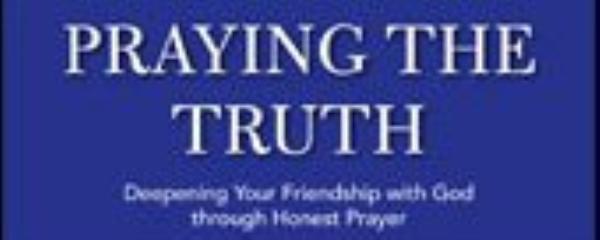The maturity, gentleness and compassion of Praying the Truth attest to the fact that it is the work of a man in his 80s who has spent his life working at and thinking about the various themes covered in its pages and who is sharing the fruits of his experience, thoughts and prayers.
Over the years, William Barry SJ has made a name for himself as a spiritual director, tertian director, clinical psychologist and writer of many books on prayer and Ignatian spirituality. Thus his reputation often precedes him, and his fame generates expectations of something showing insight and experience. Praying the Truth does not disappoint. In theory, it could be read from cover to cover within an hour or so, so simple and direct is its language. However, to read it quickly would only detract from the value and pleasure of nibbling away at the pages of this small volume, teasing out its richness one section at a time.
Barry’s tone is conversational and personal, intimate and honest. He does not resort to jargon and self-aggrandisement. His style is flowing, his anecdotes real, relevant and interesting, and the whole book is both thoughtful and thought-provoking. Barry’s abundant use of touching personal stories makes Praying the Truth useful both for personal reflection and as an aid in spiritual direction and religious formation. It is a book which young and old can enjoy, wherein they will find both worthwhile challenge and ample food for contemplation. It is certainly ideal reading material for a retreat and for private prayer.
In his introduction, Barry speaks of the importance of an open and honest relationship with God if there is to be a long and lasting friendship. He says that he hopes, ‘to help readers engage more confidently with God in the kind of conversation the best of friends have with one another.’ He then covers, in sixteen chapters, ways in which honesty in prayer is vital to establish and deepen a close relationship with the God who ‘wants a personal relationship, an adult friendship, with each of us.’
Barry discusses the way in which secrecy can poison a friendship. He points out that attempting to keep secrets from God is self-defeating, not only because God already knows us in our entirety, but also because we will only come close to God if we show him our nakedness and vulnerability, opening ourselves to his healing love. He emphasises in the headings of his chapters the importance of ‘Telling God about Your...’: Attraction, Fears, Successes, Sadness, Pettiness, Anger and Rage, Sexuality, Sins.
‘Expressing Disagreement with God’, ‘Thanking God’, ‘Learning about God’, becoming aware of the way in which friendship with God ‘humanizes’ us, and coming to terms with our past sinfulness: Barry deals with all of these themes within the space of five or six pages per topic. Whilst examining each with the wisdom of a knowledgeable and compassionate spiritual director, citing pertinent examples, Barry also makes use of the psalms and the gospels. Thus material which could potentially be found in many self-help books becomes firmly rooted in scripture, but in a way that is not ‘preachy’.
In Praying the Truth both the psalmist and Jesus show their human needs. When the disciples return from their first mission, Jesus knows that God is the cause of their success, but he also wants to share in the joy which his friends are bursting to describe. ‘There is no need to hold back on telling God about our joys, our excitement, our successes in life. We are not in competition with God. God does not look upon us as rivals. In fact, by telling Jesus about their joy, the disciples give Jesus a chance to rejoice with them and to teach them…’
Part of the beauty of Praying the Truth is that Barry does not wallpaper over the cracks. Sometimes it is easier to tell God of all that is good in life and rather more difficult to realise that it is equally important, if not more so, to see God as a friend when things are not going so well. An honest friendship with God requires that we feel free to speak of our struggles, failures, moments of depression and sinfulness without feeling that God will think less of us.
Barry’s compassionate approach to the less sunny moments of life is born of personal and vicarious experience, and of prayer: there is a sense that he is walking with the reader, offering companionship and encouragement in the most important journey of life, that of a deepening relationship with God. Perhaps that is why the final sentence of Praying the Truth is so important. After referring to the parable of the Prodigal Son, Barry reminds us that, ‘the father welcomes back the wastrel into the family as a son and throws a party for his return.’ God is there for us, loving, not judging and already out on the road, walking towards us as we falter towards a friendship beyond anything that we could ever imagine. ‘The amazing thing about God’s desire for our friendship is that God rejoices in and is grateful for our gratitude and happiness.’
Praying the Truth is a lovely little book. Perhaps the best recommendation that I can give is that I am considering passing it on to a young person in need who has never taken the time to get to know God. Somehow I do not think it will be a rejected offering.
The reviewer, Sr Janet Fearns FMDM, is Communications Coordinator for Missio.
![]() Find this book on the Loyola Press web site
Find this book on the Loyola Press web site
![]() Shop for this book on Amazon, giving a 5% cut to the Jesuit Refugee Service, UK
Shop for this book on Amazon, giving a 5% cut to the Jesuit Refugee Service, UK






